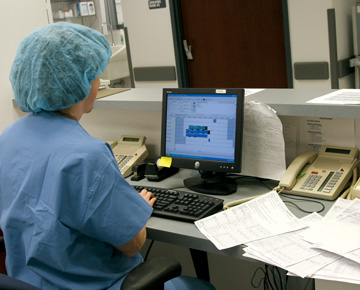Efforts to keep your GI center running on all cylinders should focus on one all-encompassing goal: optimizing efficiencies. That’s according to gastroenterologist Lukejohn Day, MD, FASGE, chief medical officer at the Zuckerberg San Francisco General Hospital and Trauma Center and professor of medicine at the University of California, San Francisco.
Performing efficient care is the single most important issue GI centers should focus on because it’s the most effective way to increase revenues and profit margins, according to Klaus Mergener, MD, PhD, MBA, MASGE, immediate past president of the American Society for Gastrointestinal Endoscopy and an affiliate professor of medicine at the University of Washington in Seattle. Dr. Mergener says outpatient GI care is a high fixed cost/low variable cost business — procedure outcomes and equipment needs are largely predictable — meaning volume is key and marginal profits are high.
He likens the cost versus profit equation to an airline’s business model, which involves spending a lot of upfront money to buy planes and hire pilots and staff. Once these elements are in place, the extra cost of putting one more passenger on a plane is nominal and produces pure profit. On the flip side, airlines lose significant amounts of money when planes take off with cabins full of empty seats. The same idea applies to endoscopy centers. The fixed costs of the facility, equipment, physicians and staff eat into profits if the daily schedule isn’t filled with money-making cases. On the other hand, cases added after the fixed costs are covered fill the coffers with net income.
To maintain a full schedule, Dr. Mergener suggests putting processes in place to prevent last-minute case cancellations. For example, call patients the day before their scheduled procedure to remind them of their appointment and to find out if there are issues or concerns that would prevent them from arriving on time.
Educating patients about prepping for their procedures is also key to keeping the schedule packed with cases. Dr. Mergener suggests providing clear written instructions on how to properly take bowel preps before colonoscopies to prevent aborted exams that leave procedure rooms empty. Patient communication apps are also an effective and efficient way to keep patients informed about the next steps in their care (see “Make Smart Investments in Efficiency”).
Dr. Mergener believes clear communication with patients is invaluable on a more basic level. Treating them like human beings instead of just another case in the middle of a busy day makes them feel safe and prepared for their procedures, a lesson that has become especially acute throughout the pandemic. “Being a wizard in the endoscopy room is great,” he says, “but clinical skill doesn’t matter if we don’t connect with our patients.”
.svg?sfvrsn=be606e78_3)


.svg?sfvrsn=56b2f850_5)